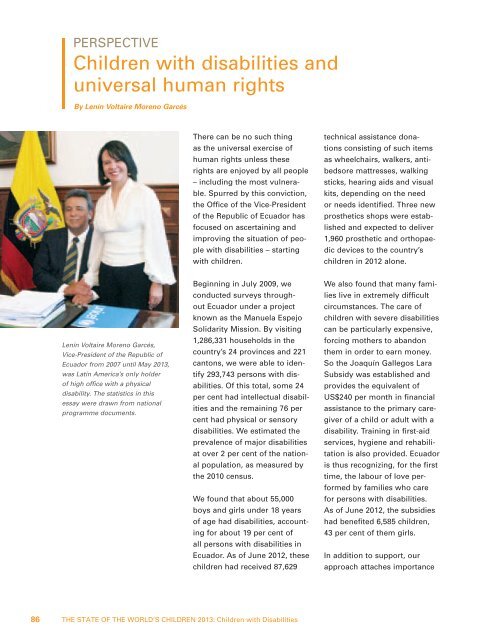State of the World's Children 2013 - Unicef
State of the World's Children 2013 - Unicef
State of the World's Children 2013 - Unicef
Create successful ePaper yourself
Turn your PDF publications into a flip-book with our unique Google optimized e-Paper software.
PERSPECTIVE<br />
<strong>Children</strong> with disabilities and<br />
universal human rights<br />
By Lenín Voltaire Moreno Garcés<br />
There can be no such thing<br />
as <strong>the</strong> universal exercise <strong>of</strong><br />
human rights unless <strong>the</strong>se<br />
rights are enjoyed by all people<br />
– including <strong>the</strong> most vulnerable.<br />
Spurred by this conviction,<br />
<strong>the</strong> Office <strong>of</strong> <strong>the</strong> Vice-President<br />
<strong>of</strong> <strong>the</strong> Republic <strong>of</strong> Ecuador has<br />
focused on ascertaining and<br />
improving <strong>the</strong> situation <strong>of</strong> people<br />
with disabilities – starting<br />
with children.<br />
technical assistance donations<br />
consisting <strong>of</strong> such items<br />
as wheelchairs, walkers, antibedsore<br />
mattresses, walking<br />
sticks, hearing aids and visual<br />
kits, depending on <strong>the</strong> need<br />
or needs identified. Three new<br />
pros<strong>the</strong>tics shops were established<br />
and expected to deliver<br />
1,960 pros<strong>the</strong>tic and orthopaedic<br />
devices to <strong>the</strong> country’s<br />
children in 2012 alone.<br />
Lenín Voltaire Moreno Garcés,<br />
Vice-President <strong>of</strong> <strong>the</strong> Republic <strong>of</strong><br />
Ecuador from 2007 until May <strong>2013</strong>,<br />
was Latin America’s only holder<br />
<strong>of</strong> high <strong>of</strong>fice with a physical<br />
disability. The statistics in this<br />
essay were drawn from national<br />
programme documents.<br />
Beginning in July 2009, we<br />
conducted surveys throughout<br />
Ecuador under a project<br />
known as <strong>the</strong> Manuela Espejo<br />
Solidarity Mission. By visiting<br />
1,286,331 households in <strong>the</strong><br />
country’s 24 provinces and 221<br />
cantons, we were able to identify<br />
293,743 persons with disabilities.<br />
Of this total, some 24<br />
per cent had intellectual disabilities<br />
and <strong>the</strong> remaining 76 per<br />
cent had physical or sensory<br />
disabilities. We estimated <strong>the</strong><br />
prevalence <strong>of</strong> major disabilities<br />
at over 2 per cent <strong>of</strong> <strong>the</strong> national<br />
population, as measured by<br />
<strong>the</strong> 2010 census.<br />
We found that about 55,000<br />
boys and girls under 18 years<br />
<strong>of</strong> age had disabilities, accounting<br />
for about 19 per cent <strong>of</strong><br />
all persons with disabilities in<br />
Ecuador. As <strong>of</strong> June 2012, <strong>the</strong>se<br />
children had received 87,629<br />
We also found that many families<br />
live in extremely difficult<br />
circumstances. The care <strong>of</strong><br />
children with severe disabilities<br />
can be particularly expensive,<br />
forcing mo<strong>the</strong>rs to abandon<br />
<strong>the</strong>m in order to earn money.<br />
So <strong>the</strong> Joaquín Gallegos Lara<br />
Subsidy was established and<br />
provides <strong>the</strong> equivalent <strong>of</strong><br />
US$240 per month in financial<br />
assistance to <strong>the</strong> primary caregiver<br />
<strong>of</strong> a child or adult with a<br />
disability. Training in first-aid<br />
services, hygiene and rehabilitation<br />
is also provided. Ecuador<br />
is thus recognizing, for <strong>the</strong> first<br />
time, <strong>the</strong> labour <strong>of</strong> love performed<br />
by families who care<br />
for persons with disabilities.<br />
As <strong>of</strong> June 2012, <strong>the</strong> subsidies<br />
had benefited 6,585 children,<br />
43 per cent <strong>of</strong> <strong>the</strong>m girls.<br />
In addition to support, our<br />
approach attaches importance<br />
86<br />
THE STATE OF THE WORLD’S CHILDREN <strong>2013</strong>: <strong>Children</strong> with Disabilities

















